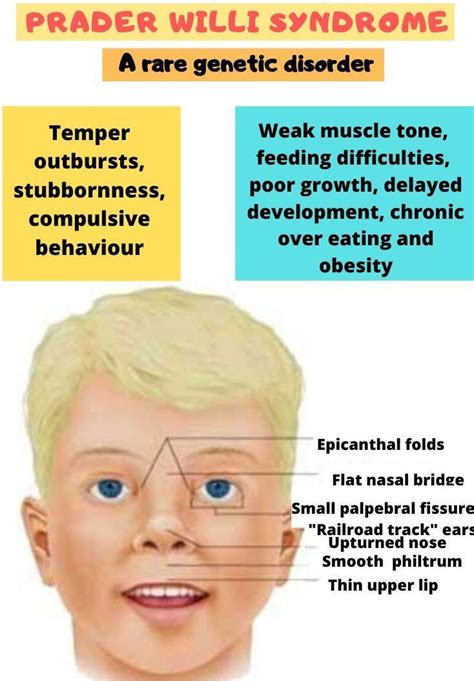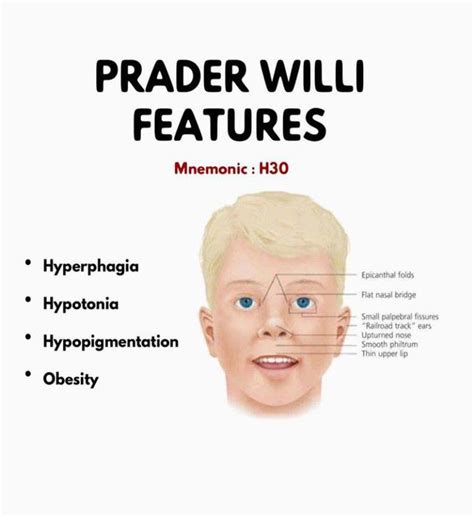prada willi symtoms | symptoms of prader willi syndrome prada willi symtoms When it works normally, it controls hunger or thirst, body temperature, pain, and when it is time to awaken and to sleep. 1 Problems with the hypothalamus can affect various . $80.00
0 · symptoms of prader willi syndrome
1 · prader willi's disease symptoms
2 · prader willi syndrome test results
3 · prader willi syndrome symptoms in children
4 · prader willi syndrome headache
5 · prader willi symptoms in babies
6 · how to treat prader willi syndrome
7 · does prader willi cause stomach pain
$35.00
What are the symptoms of Prader-Willi syndrome? Prader-Willi syndrome affects each person differently. Symptoms that appear in infancy may include: A weak cry. Lethargy (tiredness). . Signs and Symptoms. A baby may show signs of PWS early on. They may have almond-shaped eyes, their head may get narrow at the temples, their mouth might turn down .
PWS symptoms can range from poor muscle tone during infancy to behavioral problems in early childhood. Some symptoms often found in infants, besides poor muscle tone, are a lack of eye coordination; almond-shaped eyes; thin upper lip; and, due to poor muscle tone, lack of a strong sucking reflex. Their cries are weak, and they have difficulty waking up. More aspects seen in a clinical overview include hypotonia and abnormal neurologic function, h. When it works normally, it controls hunger or thirst, body temperature, pain, and when it is time to awaken and to sleep. 1 Problems with the hypothalamus can affect various . Typically, doctors suspect Prader-Willi syndrome based on signs and symptoms. A definitive diagnosis can almost always be made through a blood test. This genetic testing can .Find out about the symptoms of Prader-Willi syndrome (PWS), which affects a person's physical, psychological and behavioural development.
What are the symptoms of Prader-Willi syndrome? No two people with PWS experience the same symptoms that start at the same time. For many, PWS is present at birth, .
Typical symptoms of Prader-Willi syndrome include: an excessive appetite and overeating, which can easily lead to dangerous weight gain. restricted growth (children are much shorter than .
Definition. PWS (also known as Prader-Labhart-Willi syndrome) is a rare, genetically inherited complex neurological disorder caused by absence of expression of . Prader-Willi syndrome is a rare genetic syndrome that affects some facial features, growth, muscle strength, and other systems in the body. . What are two main symptoms of Prader-Willi syndrome? The toddler and childhood years see a shift in PWS symptoms. Key challenges emerge related to eating, learning, and behavior. Insatiable Hunger: Beginning around age 8, leading to weight gain if not managed. Learning .
Prader-Willi syndrome (PWS) is a rare, complicated condition that affects many parts of your body. . Signs and Symptoms. A baby may show signs of PWS early on. They may have almond-shaped eyes . Although specific treatments vary depending on symptoms, most children with Prader-Willi syndrome will need the following: Good nutrition for infants. Many infants with Prader-Willi syndrome have difficulty feeding due to decreased muscle tone. Your child's pediatrician may recommend a high-calorie formula or special feeding methods to help .
Genetic testing must confirm the Prader-Willi syndrome diagnosis. Almost all individuals with Prader-Willi syndrome have an abnormality within a specific area of chromosome 15. 4 Early diagnosis is best because it enables affected individuals to begin early intervention/special needs programs and treatment specifically for Prader-Willi symptoms.
Prader-Willi Syndrome Description Prader-Willi Syndrome (PWS) is a complex genetic disorder that typically causes low muscle tone, short stature, incomplete sexual development, cognitive disabilities, problem behaviours, and a chronic feeling of hunger that can lead to excessive eating and life-threatening obesity Prader-Willi syndrome is a genetic condition that causes physical, mental, and behavioral problems, as well as a constant urge to eat. . The first symptoms often emerge during the first year of .
Prader-Willi syndrome is a rare genetic disorder that affects an estimated one in 10,000 to 30,000 births. It affects many body parts as children grow and develop, and symptoms include poor muscle tone and short stature.Prader-Willi syndrome (PWS) is a genetic condition that affects many parts of the body. Infants with PWS have severe hypotonia (low muscle tone), feeding difficulties, and slow growth. Other signs and symptoms often include short stature, hypogonadism, developmental delays, cognitive impairment, and distinctive behavioral characteristics such .
Symptoms of Prader-Willi syndrome. Typically, a child with Prader-Willi syndrome is unusually floppy at birth and has feeding difficulties and a weak cry. Males often have testes that haven’t moved to the scrotum (undescended testes) and may have underdeveloped genitalia. Around half of all children with Prader-Willi syndrome will have fair .In some people with Prader-Willi syndrome, the loss of a gene called OCA2 is associated with unusually fair skin and light-colored hair. The OCA2 gene is located on the segment of chromosome 15 that is often deleted in people with this disorder. However, loss of the OCA2 gene does not cause the other signs and symptoms of Prader-Willi syndrome .
symptoms of prader willi syndrome
Prader-Willi syndrome (PWS) is characterized by severe hypotonia, poor appetite, and feeding difficulties in early infancy, followed in early childhood by excessive eating and gradual development of morbid obesity (unless food intake is strictly controlled). Motor milestones and language development are delayed. All individuals have some degree of cognitive .Prader-Willi syndrome (PWS) is a rare genetic condition that affects multiple organ systems, causing both physical and mental symptoms and impairing normal growth and development. Currently, no cure is available, but professional care can improve patients’ quality of life. 1,2 The clinical signs and symptoms of PWS and how severe they are depend on the age of the patient.Many symptoms of Prader-Willi syndrome vary according to the child's age. Newborns with the syndrome feel limp, feed poorly, and gain weight slowly. Eventually these symptoms resolve. Then, between the ages of 1 and 6, appetite increases, often becoming insatiable. Children rapidly gain weight. The hands and feet remain small, and children .Prader-Willi syndrome (PWS), also known as Prader-Labhart-Willi syndrome and Willi-Prader syndrome, is a complex genetic disorder characterized by poor muscular tone (severe hypotonia), feeding difficulties, and delayed growth in .
Symptoms of Prader-Willi Syndrome . At first, an infant with Prader-Willi syndrome will have trouble growing and gaining weight (failure to thrive). Because of weak muscles (hypotonia), the infant is not able to drink from a .The symptoms of Prader-Willi syndrome are likely due to dysfunction of a portion of the brain called the hypothalamus. The hypothalamus is a small endocrine organ at the base of the brain that plays a crucial role in many bodily functions, including regulating hunger and satiety, body temperature, pain, sleep-wake balance, fluid balance . Q: What is the life expectancy of a person with Prader-Willi syndrome? A: The median age of death is 30 years, but life expectancy ranges from 1 month to 58 years. Q: What are the two main symptoms of Prader-Willi syndrome? The primary symptoms are increased appetite, weight gain and difficulties with muscle control/weakness.Many symptoms of Prader-Willi syndrome vary according to the child's age. Newborns with the syndrome feel limp, feed poorly, and gain weight slowly. Eventually these symptoms resolve. Then, between the ages of 1 and 6, appetite increases, often becoming insatiable. Children rapidly gain weight. The hands and feet remain small, and children .
Prader-Willi syndrome (PWS) is a genetic disorder that can lead to a wide array of symptoms, including obesity and developmental delays.It results when there is a problem with a portion of chromosome 15. Babies born with PWS have poor muscle tone and a weak cry.Humans have 46 chromosomes (23 pairs). One of the chromosomes that belongs to pair number 15 is different in Prader-Willi syndrome. Around 70% of cases of Prader-Willi syndrome are the result of missing genetic information from the copy of chromosome 15 inherited from the father. This is referred to as "paternal deletion".Checklist for diagnosing Prader-Willi syndrome. A checklist of symptoms known to be typical of Prader-Willi syndrome is also used to identify which children should be tested. The checklist can help parents concerned about their child's development, behaviour and eating habits, who want to know whether their child may have Prader-Willi syndrome.

chloe love story eau sensuelle 50ml
Prader-Willi Syndrome (PWS) is a rare genetic disorder. It causes poor muscle tone, low levels of sex hormones and a constant feeling of hunger. . What Are the Symptoms of Prader-Willi Syndrome (PWS)? (Eunice Kennedy Shriver National Institute of Child Health and Human Development) . Prader-Willi syndrome (PWS) is a rare neurodevelopmental genetic disorder associated with a characteristic behavioral phenotype that includes severe hyperphagia and a variety of other behavioral challenges such as temper outbursts and anxiety. These behaviors have a significant and dramatic impact on the daily functioning and quality of life for the person .The 2024 Angel Drive is PWSA | USA’s largest annual fundraising campaign, dedicated to bringing hope and essential support to families and individuals impacted by Prader-Willi syndrome.This year, the Angel Drive not only supports our life-changing programs—like school advocacy, medical crisis support, and caregiver resources—but also marks the beginning of .
Learn about Prader-Willi syndrome, find a doctor, complications, outcomes, recovery and follow-up care for Prader-Willi syndrome. Toggle navigation Toggle search. Search. . Other symptoms may include: Trouble feeding as an infant, with poor weight gain; Almond-shaped eyes; Delayed muscle and motor function development;Prader-Willi syndrome is a genetic condition that occurs in about 1 in every 12,000-15,000 people. Signs and symptoms of Prader-Willi syndrome
chloe marci medium

$179.99
prada willi symtoms|symptoms of prader willi syndrome


























